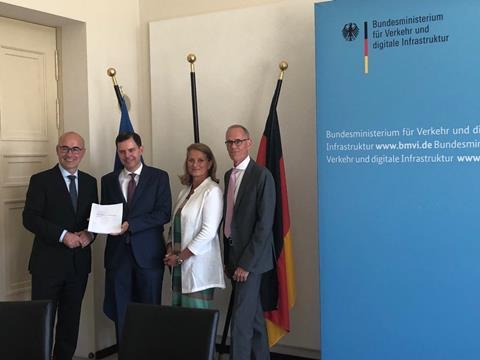
GERMANY: Further separation of infrastructure provider DB Netz from the Deutsche Bahn group is amongst a raft of measures recommended by the Monopolies Commission to enhance quality and competition on the rail network.
In its seventh report, published on July 25, the Commission highlights the need for better service quality, especially punctuality, and draws attention to the poor state of Germany’s railway infrastructure and the increasing number of engineering worksites that are causing delays. Failure to ensure punctual services means that the government’s environmentally-motivated objective of increasing rail traffic was receding over the horizon, the Commission asserts.
‘Boosting rail travel does not just need investment in the infrastructure, but changes to the institutional framework as well’, said Monopolies Commission Chairman Achim Wambach. Allocating responsibility to the organisation causing a delay, providing quality incentives in the regulatory framework and introducing more competition would lead to ‘a significant improvement in the quality of infrastructure and train punctuality’, he suggested.
Top of the Commission’s list of recommendations is the separation of DB Netz from DB’s train operating businesses. Noting the existence of ‘incentives and possibilities for the vertically-integrated infrastructure provider of the DB group to discriminate against competitors in downstream transport markets’, it says that even if regulation limits the opportunities, the potential for non-price related discrimination cannot be ruled out under the current structure.
The Commission believes that punctuality would improve if infrastructure providers were to take responsibility for and reimburse the cost of delays that they caused — at the moment DB Netz does not have to compensate train operators for any delays for which it is responsible. This would mean documenting all delays and setting up a system of compensation payments designed to incentivise the various parties.
The Commission has also called for additional criteria to be used in assessing the quality of the network. Providing a lump-sum subsidy to DB Netz for infrastructure renewals does not guarantee that the work will be carried out sustainably and efficiently, it argues.
While competition in the rail market has developed ‘in a positive way’, particularly in the regional passenger and freight businesses, it has proved less effective in the long-distance passenger segment. Less than 1% of traffic is now being handled by operators other than DB, the Commission notes. This is related to the high level of track access charges, and the Commission recommends that lower fees be introduced. While this would reduce revenue in the short term the shortfall would be at least partly balanced by an increase in traffic in the medium term. Selective higher charges for the use of congested routes and for noise emissions could also mitigate the loss of revenue, it suggests.
Access to suitable rolling stock is essential for competition to work in the long-distance sector, the Commission points out. As an incumbent DB Fernverkehr enjoys advantages over new entrants in this field, and the Commission wants to see a level playing field to be established in rolling stock financing. This could be achieved by introducing leasing models similar to those in the airline sector.
The current arrangements for path allocation by DB Netz also offer opportunities for discrimination, the Commission finds. In particular, the time available for path applications and allocation is insufficient while the rules for resolving conflicts do not encourage competition. In this context the Commission draws attention to the government’s Deutschland-Takt proposals for a national regular-interval timetable, pointing out that these are not compatible with the current market-driven access model and warning that regulatory planning should not be subject to a ‘technical’ timetable concept.

















